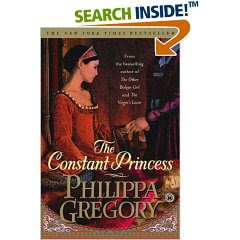
The Constant Princess is about King Henry VIII’s first wife Katherine of Aragon, mostly before they get married. She is betrothed to Henry’s older brother Arthur at the age of three and grew up her entire life knowing that she would someday be the queen of England. Her first marriage gets off to a rocky start, but eventually she and Arthur learn to love one another and have a rather passionate four months together before he dies. It is at this point that Katherine’s fate is undecided. She is the right political match for Henry but she’s 6 years his senior, and since he’s only 11 at the time that’s a big deal. Henry VII, Henry VIII’s father, takes a liking to Katherine and proposes marriage to her after his wife Elizabeth dies in childbirth. Katherine at first accepts but then realizes that her power would be minimal with such a strong king and decides to wait for Henry to figure out that they should be married. Of course he does, they are betrothed, but Henry VII doesn’t make life easy for Katherine, keeping her in poverty by refusing her allowance and making life otherwise miserable for her. He soon dies, though, leaving Henry free to choose his wife, so he chooses Katherine. The story ends with Katherine’s triumphant victory over the Scots through a battle that ended in King James’s death.
While I really enjoyed the first half of this book, the middle and latter half really brought me down. Katherine suffered the plight of so many other of Gregory’s heroines: power greed. Gregory paints such a power hungry picture of Katherine that she ceases to be a “real” character for me and moves into the archetype that she created with Anne Boleyn. And while I don’t doubt that someone of Katherine’s station has to be power hungry, the overt manipulations, the decisions, the plotting, all get old after a couple hundred pages. And the epiphany on the battle field where Katherine realizes that if she were to lay waste to Scotland that she would be perpetuating her mother’s wrongs, fell flat for me. I guess Katherine had grown and matured by that point, but the switch was so abrupt that it felt lacking in sincerity.
So, while I would recommend this book to lovers of Gregory’s work, especially the Tudor era novels, I would recommend those who want a less stock portrayal of Katherine to steer clear of it. I will read her next book, the Boleyn Inheritance, because I like her story telling and can tolerate her women when they get greedy, but I would love a more holistic portrayal of the life and times of the Henry VIII court that what was found in the Queen’s Fool.
While I really enjoyed the first half of this book, the middle and latter half really brought me down. Katherine suffered the plight of so many other of Gregory’s heroines: power greed. Gregory paints such a power hungry picture of Katherine that she ceases to be a “real” character for me and moves into the archetype that she created with Anne Boleyn. And while I don’t doubt that someone of Katherine’s station has to be power hungry, the overt manipulations, the decisions, the plotting, all get old after a couple hundred pages. And the epiphany on the battle field where Katherine realizes that if she were to lay waste to Scotland that she would be perpetuating her mother’s wrongs, fell flat for me. I guess Katherine had grown and matured by that point, but the switch was so abrupt that it felt lacking in sincerity.
So, while I would recommend this book to lovers of Gregory’s work, especially the Tudor era novels, I would recommend those who want a less stock portrayal of Katherine to steer clear of it. I will read her next book, the Boleyn Inheritance, because I like her story telling and can tolerate her women when they get greedy, but I would love a more holistic portrayal of the life and times of the Henry VIII court that what was found in the Queen’s Fool.
No comments:
Post a Comment